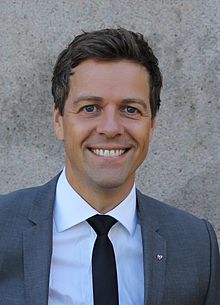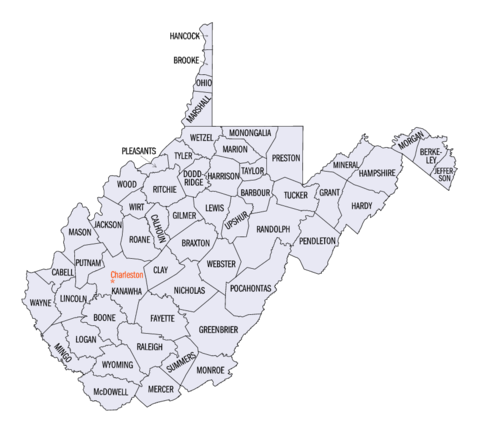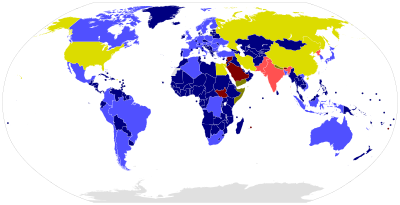Portal:Politics
| Main | Topics and categories | Tasks and projects |
The Politics portal
Politics (from Ancient Greek πολιτικά (politiká) 'affairs of the cities') is the set of activities that are associated with making decisions in groups, or other forms of power relations among individuals, such as the distribution of status or resources. The branch of social science that studies politics and government is referred to as political science.
Politics may be used positively in the context of a "political solution" which is compromising and non-violent, or descriptively as "the art or science of government", but the word often also carries a negative connotation. The concept has been defined in various ways, and different approaches have fundamentally differing views on whether it should be used extensively or in a limited way, empirically or normatively, and on whether conflict or co-operation is more essential to it.
A variety of methods are deployed in politics, which include promoting one's own political views among people, negotiation with other political subjects, making laws, and exercising internal and external force, including warfare against adversaries. Politics is exercised on a wide range of social levels, from clans and tribes of traditional societies, through modern local governments, companies and institutions up to sovereign states, to the international level.
In modern nation states, people often form political parties to represent their ideas. Members of a party often agree to take the same position on many issues and agree to support the same changes to law and the same leaders. An election is usually a competition between different parties.
A political system is a framework which defines acceptable political methods within a society. The history of political thought can be traced back to early antiquity, with seminal works such as Plato's Republic, Aristotle's Politics, Confucius's political manuscripts and Chanakya's Arthashastra. (Full article...)
Selected article
The Latin American Boom (Boom latinoamericano) was a literary movement of the 1960s and 1970s when the work of a group of relatively youthful Latin American novelists became widely circulated in Europe and throughout the world. The Boom is most closely associated with Julio Cortázar of Argentina, Carlos Fuentes of Mexico, Mario Vargas Llosa of Peru, and Gabriel García Márquez of Colombia; but it also brought fame to older writers like Jorge Luis Borges, Pablo Neruda and Ernesto Sábato. Influenced by European and North American Modernism, but also by the Latin American Vanguardia movement, these writers challenged the established conventions of Latin American literature. Their work is experimental and, owing to the political climate of the Latin America of the 1960s, often very political. "It is no exaggeration", critic Gerald Martin writes, "to state that if the Southern continent was known for two things above all others in the 1960s, these were, first and foremost, the Cuban Revolution and its impact both on Latin America and the Third World generally, and secondly, the Boom in Latin American fiction, whose rise and fall coincided with the rise and fall of liberal perceptions of Cuba between 1959 and 1971." The sudden success of the Boom authors was in large part because their works were among the first Latin American novels to be published in Europe, by publishing houses such as Barcelona's avant-garde Seix Barral in Spain. Indeed, Frederick M. Nunn writes that "Latin American novelists became world famous through their writing and their advocacy of political and social action, and because many of them had the good fortune to reach markets and audiences beyond Latin America through translation and travel—and sometimes through exile."
Featured picture

Xi Jinping (pronounced [ɕǐ tɕînpʰǐŋ], Chinese: 习近平; born 15 June 1953) is the General Secretary of the Communist Party of China, China's "paramount leader".
Unlike the other 49 states, Hawaii does not delegate educational responsibility to local school boards; public education is carried out by the Hawaii State Department of Education. Hawaiian counties collect property taxes and user fees in order to support road maintenance, community activities, parks (including life guards at beach parks), garbage collection, police (the state police force, called the Hawaii Department of Public Safety, is limited in scope), ambulance, and fire suppression services. (Full article...)

The premier of British Columbia is the first minister for the Canadian province of British Columbia. The province was a British crown colony governed by the governors of British Columbia before joining Canadian Confederation in 1871. Since then, it has had a unicameral Westminster-style parliamentary government, in which the premier is the leader of the party that controls the most seats in the legislative assembly. The premier is British Columbia's head of government, and the king of Canada is its head of state and is represented by the lieutenant governor of British Columbia. The premier picks a cabinet from the elected members to form the Executive Council of British Columbia and presides over that body.
Members are first elected to the legislature during general elections. General elections must be conducted every four years from the date of the last election. An election may also take place if the governing party loses the confidence of the legislature by the defeat of a supply bill or tabling of a no-confidence motion. (Full article...)
Selected quote
Selected biography

Knut Arild Hareide (born 23 November 1972) is a Norwegian politician who served as a member of parliament from Hordaland and as the leader of the Christian Democratic Party from 2011 to 2019. He served as Minister of Transport and Communications from 2020 to 2021, and as Minister of the Environment from 2004 to 2005 in the second Bondevik cabinet. In 2007, he announced he would step down from the national political scene for the time being, but he returned when he was nominated as the top candidate for the Christian Democratic Party ticket in Akershus in the 2009 election where he won the county's leveling seat. After Dagfinn Høybråten stepped down as party leader, Hareide was unanimously elected to take his place at the 2011 party convention. In the 2013 election, Hareide was reelected to parliament, this time from his home county of Hordaland.
Did you know (auto-generated) -

- ... that after criticizing the political patronage system, John Silva Meehan was hired as Librarian of Congress through "purely an act of political patronage"?
- ... that Valentina Bodrug-Lungu has declared that Moldova's political climate does not encourage female participation, despite having a woman president?
- ... that Sears heiress Edith Rosenwald Stern organized a women's broom brigade against political corruption in New Orleans?
- ... that following the ban of its labour unions in 1934, the Romanian United Socialist Party would rely on its youth and women's wings for political action?
- ... that Azerbaijan has been a member of the Council of Europe, an organization promoting human rights, for more than twenty years, despite holding political prisoners and rigging elections?
- ... that American football wide receiver Bo Hines transferred to Yale University as a freshman to further his political ambitions?
More did you know...
- ...that the traditional form of government in Tibet from 1642 to 1951 was the Cho-sid-nyi?
- ...that the 1968 pamphlet Is the School House the Proper Place to Teach Raw Sex? claimed that sex education was a Communist conspiracy?
- ...that the American Society of Magazine Editors book The Best American Magazine Writing 2007 features investigative journalism about the Beslan school hostage crisis and survivors of Agent Orange?
- ...that the Libyan opposition has embraced "Zenga Zenga", an Israeli-created auto-tuned song and viral YouTube video that parodies Libyan ruler Muammar Gaddafi (pictured)?
- ...that the Brown Dog affair, an Edwardian era vivisection controversy, led to massive riots?
- ...that Roman embassies to China are reported in Chinese historical accounts from as early as 166?
In this month
- September 14, 2003 – Estonia approves joining the European Union in a referendum.
- September 21, 1854 – the United States Republican Party is founded. The party opposed the expansion of slavery, called for free homesteads to farmers ("free soil"), and sought to modernize banking, railroads, and industry.
News and Current events
- August 11: 4 local government areas in New South Wales, Australia locked down after COVID-19 case
- August 11: Australia: AstraZeneca vaccine access expanded by Victorian government
- August 1: Australia: Victorian lockdown lifted
- July 29: Tunisia's president dismisses prime minister, suspends parliament
- July 25: Australia: Wikinews interviews Reg Kidd, mayor of the City of Orange, about COVID-19 lockdown and local government
- July 23: South Australia enters week-long lockdown to contain COVID-19 Delta variant spread
- July 21: Technological University Dublin senior lecturer Dr Lorcan Sirr speaks to Wikinews on housing market in Ireland
- July 21: Three rural councils in New South Wales, Australia enter 7-day lockdown
- July 21: Australia: Victoria lockdown extended by a week with 85 active cases recorded
- July 15: California governor signs new state budget, eligible Californians to get stimulus payments
Topics and categories
General images
Related portals
Associated Wikimedia
The following Wikimedia Foundation sister projects provide more on this subject:
-
Commons
Free media repository -
Wikibooks
Free textbooks and manuals -
Wikidata
Free knowledge base -
Wikinews
Free-content news -
Wikiquote
Collection of quotations -
Wikisource
Free-content library -
Wikiversity
Free learning tools -
Wiktionary
Dictionary and thesaurus

























































